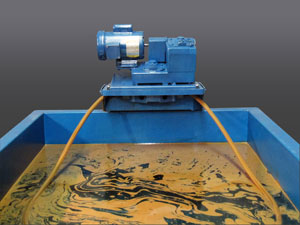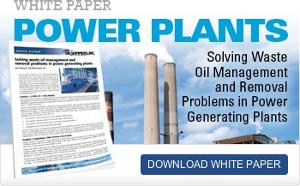Cost-Efficient Oil Skimmer Simplifies Wastewater Treatment – Reprinted from Pollution Engineering

Tim Ruch, head mechanic at Viessman Trucking in Mankato, MN, knew that oily sludge was a problem – specifically, the oily sludge in wastewater from cleaning out the company’s tanker trucks. Meeting municipal regulations for wastewater effluent involved numerous chemicals, equipment and labor hours. However, after purchasing a fully automatic oil skimmer from Oil Skimmers Inc. of Cleveland, the trucking firm now meets its effluent regulations more efficiently, using less chemicals and with less oversight.
As head mechanic, Ruch is charged with maintaining a fleet that includes 250 tankers, 35 of which are devoted to hauling soybean oil. It’s Ruch’s job to make sure the tanker trucks are cleaned out thoroughly after transporting material. Often, residual sludge must be removed from 15,000-pound stainless steel semi-tankers after hauling 48,000 pounds of consumergrade soybean oil. After the crew washes the inside of the tanker, the wastewater requires processing before it can be discharged to the City of Mankato sewer system.
To help remedy this situation, Ruch wanted an oil skimmer system that would more efficiently remove unwanted oil before the wastewater was processed through the facility’s dissolved air flotation (DAF) unit. He purchased the company’s first skimmer from Oil Skimmers Inc., in 1999, has purchased two skimmers since then and plans to buy another.
The heart of this oil skimming system is a polyurethane closed-loop tube, which circulates on the water’s surface and attracts oil as it floats, automatically adjusting to changing water levels. As the oil-covered tube passes through scrapers to be cleaned of oil, it automatically returns to the water’s surface to collect more oil. The recovered oil, which is virtually water free, flows into a collection vessel.
The water-free recovered oil also has reduced Ruch’s disposal costs. “The oil skimmers we presently own have saved us enough time and money to more than pay for their cost,” he says, noting that purchasing the oil skimmers has simplified his primary goal of meeting municipal regulations for recycling wastewater.
“Knowing that we satisfy the municipality takes a big load off my shoulders;’ Ruch says. “That fact alone makes purchasing the oil skimmers one of our best long-term investments!
Previously, before installing the Model 5H oil skimmer, a maintenance crew sprayed water mixed with a non-toxic chemical into the trailers to clean out the residual oil. The oil-infused water was collected in holding tanks, and the crew then manually skimmed oil from the holding tank. The DAF unit was used with a flocking agent to break up the remaining oil and bring the residuals to the top of the water. The DAF unit then removed the remaining sludge from the water.
“I appreciate that municipal guidelines for wastewater are strict,” says Ruch. “However, it costs us money to bring our wastewater up to standards for recycling back into the system. Add those costs to the increased cost of fuel to run the tankers, plus the normal cost of doing business, and I figured there had to be a better way.”
According to Ruch, the DAF unit works well, but is expensive to operate and maintain. “Before purchasing the oil skimmer, we would put in a lot of hours to manually skim the oil from holding tanks before using the DAF unit,” Ruch says.
The oil skimmer has eliminated the process of manually collecting sludge from the wastewater.
“Then we had to add a lot of flocking agent in the DAF unit to break up the oil, which also raises the cost of operation.”
The oil skimmer has eliminated the process of manually collecting sludge from the wastewater. This allows the DAF unit to refine the wastewater more efficiently, using a smaller amount of chemicals.
“There’s little or no maintenance or upkeep with the Model 5H because there are few moving parts,” Ruch notes. “We can let it run day and night, and occasionally look to see that the container holding the skimmed oil is not overflowing.’
The fully automatic Model 5H offers rugged construction and few moving parts, which contributes to continuous operation with minimal wear and tear. Ken Gray, Oil Skimmers sales manager, western region, notes that in some cases, models purchased more than 25 years ago are still operating today.



